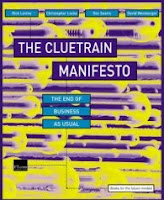Better late than never
 Six years ago, when I changed career from marine insurance (!) to web development, I was getting to grips with a new set of tools and ideas in project management, and trying to soak up as much knowledge as possible from my colleagues. I didn't really consider the landscape outside of the project management realm - there was so much other new stuff to focus on. But I recall very clearly that there was an eye-catching, brightly coloured book which moved from desk to desk in our offices - The Cluetrain Manifesto.
Six years ago, when I changed career from marine insurance (!) to web development, I was getting to grips with a new set of tools and ideas in project management, and trying to soak up as much knowledge as possible from my colleagues. I didn't really consider the landscape outside of the project management realm - there was so much other new stuff to focus on. But I recall very clearly that there was an eye-catching, brightly coloured book which moved from desk to desk in our offices - The Cluetrain Manifesto.No-one recommended the book to me at the time, and I didn't pay it much attention as a result. In fact it seemed to just gather dust in different places, but a few recent blog postings I've read have made reference to it in revered tones, as a kind of bible for the internet age. I decided it was time to catch up.
It's a bold and brilliant book and I'd encourage anyone using or working with the web to read it. But what has made it all the more interesting is that it has become no less relevant than when it was written in 2000. In fact, the context of Six More Years of Progress has thrown a very interesting light on it.
The general theme is that the internet has broken down the walls of big business. We all have greater access to truth and expertise, and the traditional barriers put in place by big business - press releases, advertising, mission statements, company hierarchies - can and must be circumvented. People working for companies should be encouraged to share their enthusiasm and knowledge directly with the public via the web. And companies who fail to support this will lose credibility and, with it, customers.
All this was already happening (back in 2000), and the manifesto stated that companies who fail to 'get on board the cluetrain' will fail. Just six short years of history have thrown an interesting perspective on the thesis. For one, some of the most successful companies - Apple and Google being the obvious examples - have retained a high level of secrecy to great success. The traditional 'barriers', image and branding, remain as effective as ever.
I also felt it was optimistic to think that everyone who works for a given company would want that kind of contact with a customer. Or to think that all kinds of customers want that kind of contact either. People are naturally resistant to change. My benchmark for this level of adoption is; would the Royale family be interested? Almost certainly not. They are happy watching TV every night and drinking the advertising kool aid, a drink which big brands are still more than happy to serve up. I don't see that changing anytime soon.
But what was amazing was how much of the book is still as relevant today as it was in 2000 - if not more so, at least from my perspective. Companies such as Sony have suffered horribly over the past few years because of their attempts to hide the truth (think: Sony Rootkit). And while Apple control their brand and image very closely, their forums are open and brilliant. The actions of every major company are scrutinised on Digg, the Blogosphere and in traditional media - and that's great for everyone except the companies who are either hiding something or who aren't willing to engage with their customers.
Of course these things take time. But I'm encouraged to think that we're moving in the right direction. Who's to say that the next 20 years won't prove the writers of the Cluetrain Manifesto right in the long run?
Comments